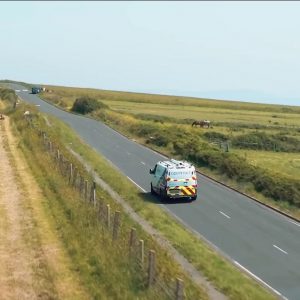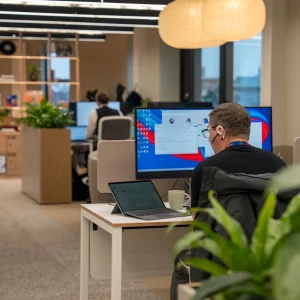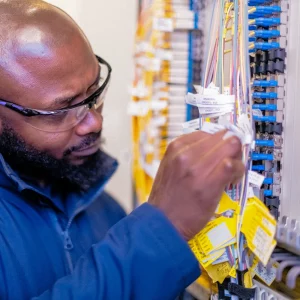Sponsored Links
Rural UK Village of Lyddington Deploys Own 40Mbps Broadband ISP
Posted: 14th Apr, 2010 By: MarkJ
 Residents of Lyddington UK, a small rural village that BT deemed not economically viable for faster broadband services, have banded together and raised £37,000 to setup their own 'up to' 40Mbps Fibre-to-the-Cabinet ( FTTC ) based next generation broadband network.
Residents of Lyddington UK, a small rural village that BT deemed not economically viable for faster broadband services, have banded together and raised £37,000 to setup their own 'up to' 40Mbps Fibre-to-the-Cabinet ( FTTC ) based next generation broadband network.The service is managed by community ISP Rutland Telecom and claims to be the first provider in the UK to develop FTTC combined with fully unbundled ( LLU ) copper phone lines to deliver superfast broadband services. Average download speeds in the area have now increased from 0.5Mbps to 25Mbps.
The process of deploying Lyddington's new network was not an easy one, taking two years from concept to today's deployment, and required intervention by Ofcom. At present some 50 customers are already using the service, which reaches a total of just 200 homes.
David Lewis, MD of Rutland Telecom, told BBC News Online :
"We found that any company could do, on a smaller scale, what Carphone Warehouse has done and take over BT's network. For the first time in UK telecommunications history the telephone lines of customers are completely cut off from the local BT exchange."
"We found that any company could do, on a smaller scale, what Carphone Warehouse has done and take over BT's network. For the first time in UK telecommunications history the telephone lines of customers are completely cut off from the local BT exchange."
There are currently a multitude of similar schemes taking place in rural and semi-urban locations around the country. Lyddington's experimental service will now also be deployed to a number of other isolated rural villages in Rutland.
However BT has warned that the area risks developing a local monopoly unless it allows rival ISPs access to the new network. That might be fair comment to make against a big provider, but perhaps not in an area where the residents themselves paid to develop their own tiny network because BT refused to do so.
UPDATE 10:51am
BT just sent us their full statement.
Olivia Garfield, Group Strategy Director at BT, said:
"This is a positive development as, to date, BT has been alone in investing in rural areas. This isn't ideal if fibre broadband is to be widely available in as short a time frame as possible. We are delighted to help Rutland Telecom reach the homes in the village and we wish them success with their programme. We hope they will offer open access to their network, in the way BT does, as otherwise there is the risk of a local monopoly developing which is never good for consumers."
"This is a positive development as, to date, BT has been alone in investing in rural areas. This isn't ideal if fibre broadband is to be widely available in as short a time frame as possible. We are delighted to help Rutland Telecom reach the homes in the village and we wish them success with their programme. We hope they will offer open access to their network, in the way BT does, as otherwise there is the risk of a local monopoly developing which is never good for consumers."
Search ISP News
Search ISP Listings
Search ISP Reviews
Latest UK ISP News








Cheap BIG ISPs for 100Mbps+
150,000+ Customers | View More ISPs
Cheapest ISPs for 100Mbps+
Modest Availability | View More ISPs
Latest UK ISP News
Helpful ISP Guides and Tips
Sponsored Links
The Top 15 Category Tags
- FTTP (6834)
- BT (3896)
- Politics (3087)
- Business (2780)
- Openreach (2674)
- Building Digital UK (2520)
- Mobile Broadband (2490)
- FTTC (2145)
- Statistics (2139)
- 4G (2106)
- Virgin Media (2036)
- Ofcom Regulation (1785)
- 5G (1748)
- Fibre Optic (1607)
- Wireless Internet (1601)
Sponsored
Copyright © 1999 to Present - ISPreview.co.uk - All Rights Reserved - Terms , Privacy and Cookie Policy , Links , Website Rules































